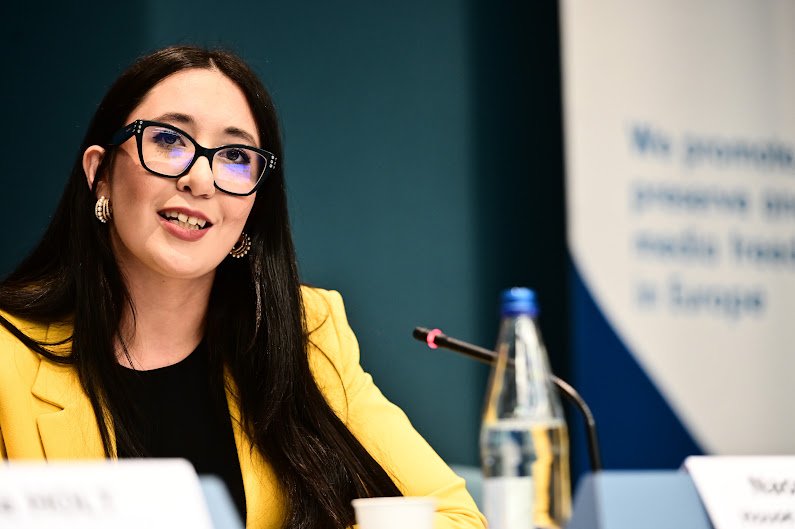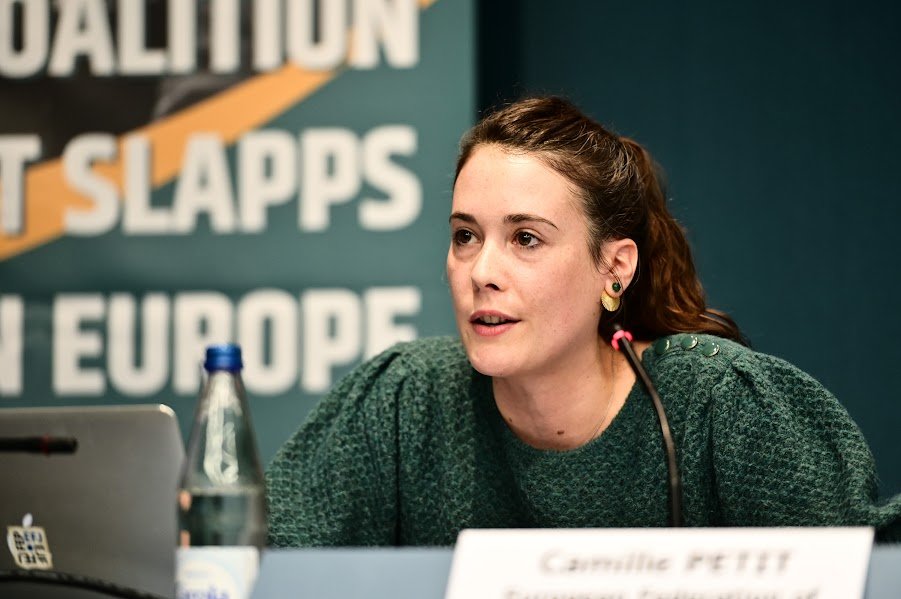PATFox attends the First European Anti-SLAPP Conference
On 20 October 2022, PATFox attended the first European Anti-SLAPP Conference, organized by the European Centre for Press and Media Freedom (ECPMF) and the Coalition Against SLAPPs in Europe (CASE), which took place at the Palais d’Europe in Strasbourg.
The conference brought together CASE coalition members, SLAPP victims, experts, journalists, media professionals, lawyers, policymakers, free speech advocates, academics, ombudsmen, judges, and civil society representatives. The conference was followed the next day with an in-person planning meeting for members of CASE, in which the importance of training initiatives to tackling SLAPPs was discussed in detail.
Roberta Metsola and Věra Jourová (image: ECPMF)
The conference opened with keynote speeches from some of the key policymakers spearheading anti-SLAPP action on a European level – Roberta Metsola, President of the European Parliament; Věra Jourová, Vice President for Values and Transparency at the European Commission; Council of Europe Secretary General Marija Pejčinović Burić and the institution's Commissioner For Human Rights Dunja Mijatović. Mijatović affirmed that SLAPPs are "the second most dangerous threat to freedom of expression after physical violence" and additionally threaten the rights of assembly and access to information.
Pierre Rabourdin, Policy and legal officer, European Commission Directorate-General for Justice and Consumers (image: ECPMF)
A first panel turned to the detail of the legislative process within the European institutions in a discussion that included members of the European Commission (Pierre Rabourdin, Policy and legal officer, Directorate-General for Justice and Consumers Democracy Team – Unit: Union citizenship and free movement European Commission, Pia Lindholm, Deputy Head of Unit for Civil Justice in Directorate-General Justice and Consumers, the European Commission), the European Parliament (Tiemo Wölken, Member of the European Parliament (SPD-S&D), JURI Rapporteur on the Anti-SLAPPs Directive), and the Council of Europe (Karmen Turk, Chair of the Council of Europe Expert Committee on Strategic Lawsuits against Public Participation (MSI-SLP), Lecturer, University of Tartu and Partner at the Law Firm TRINITI, Estonia). The panelists discussed the mandatory and advisory status of different initiatives, with representatives of the Commission keen to emphasise that they were also pressing for member states to bring their legal systems in line with the contents of the Recommendation, as well as the (pending) Directive.
Naomi Cachia, Member of the House of Representatives, Malta (image: ECPMF)
The second panel focused on the national initiatives that have been developed to push back against SLAPPs, in particular in UK (Beatriz Brown, Policy Lead – Strategic Lawsuits Against Public Participation (SLAPPs), Ministry of Justice), Ireland (Andrew Munro, Head of Policy for Civil Justice, Department of Justice, Ireland) and Malta (Naomi Cachia, Member of the House of Representatives, Malta).
There are significant differences between the three countries. Ireland has already signaled that it will opt-in to EU anti-SLAPP legislation. There has been significant criticism of the draft Maltese legislation, which was formulated without consultation and stands to establish much weaker protections than those being discussed at the EU level. The Russian invasion of Ukraine gave a real impetus to legislative proposals to prevent wealthy foreign nationals using the domestic legal system as a tool of influence, though ongoing political changes in the UK make the trajectory of reform efforts uncertain.
Julia Nebel, Luhze Newspaper (image: ECPMF)
In the third panel, journalists and representatives of media organisations from different part of Europe (Gillian Phillips, Director of Editorial Legal Services, The Guardian; Andrew Rettman, Foreign Affairs Journalist, EU Observer; Hind Fraihi, Investigative Journalist, Apache; Piotr Stasiński, Deputy Editor-in-Chief, Gazeta Wyborcza, Julia Nebel, Luhze Newspaper) had the opportunity to raise their voices as one of the groups most affected by SLAPPs. The experience of Luhze, a Leipzig-based student paper who received legal papers on Christmas eve, was a reminder that freelancers and small organisations without major backing are particularly threatened by SLAPPs
Also, the Conference acknowledged the pivotal role played by civil society organisations in fighting back against SLAPPs which was at center of an interesting discussion between Dirk Voorhoof, Prof. em. Human Rights Centre Ghent University, Legal Human Academy and Member of the CoE MSI-SLP Committee on Anti-SLAPP, Lukas Straumann, Executive Director, Bruno Manser Fond (Switzerland), Susan Coughtrie, Deputy Director, Foreign Policy Centre and co-chair of the UK Anti-SLAPP Coalition (United Kingdom), and Walter Strobl of PresseClub Concordia (Austria).
Camille Petit, European Federation of Journalists (image: ECPMF)
This debate paved the way toward a conversation on the array of different advocacy and practical initiatives which can support SLAPP victims. Representatives from various CSOs shared their experiences, designing and implementing effective anti-SLAPP strategies, among them Camille Petit, Communications and Project Officer at the European Federation of Journalists; Sarah Clarke, Head of Europe and Central Asia, ARTICLE 19 Europe; Tom Gibson, EU Representative and Advocacy Manager, Committee to Protect Journalists; Gordana Miladinovic, Member Center Coordinator, Organized Crime and Corruption Reporting Project (OCCRP) and Tabea Caspary, Legal Assistant, European Centre for Press and Media Freedom.
Finally, CASE announced the winners of the second European SLAPP Contest, intended to name and shame the most egregious litigants of the year.
The end of the conference was marked by the publication of an Anti-SLAPP Declaration, which contains a recap of progress to date and detailed recommendations for each of the European institutions going forward.
The full video of the Conference can be viewed on YouTube.






